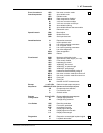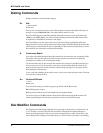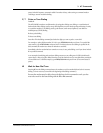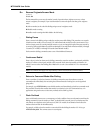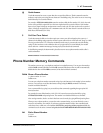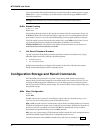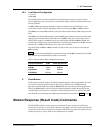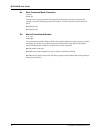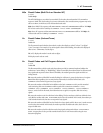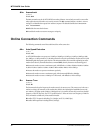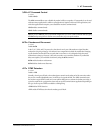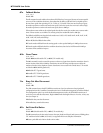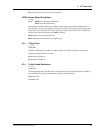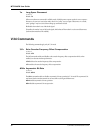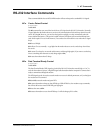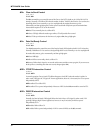
3 AT Commands
CommPlete Communications Server 23
&Qn Result Codes (Multi-Tech or Standard AT)
n
= 0 or 1
Default: &Q0
The MT3334HD8 gives you a choice between Multi-Tech result codes and standard AT command set
responses. Multi-Tech result codes give you more information, but some datacomm programs may not be
able to use them, in which case, select the standard result codes.
&Q0 selects Multi-Tech responses with
RELIABLE, LAPM, and COMPRESSED
modifiers. With &Q0,
the verbose result code for 14,400 bps is
CONNECT 14400
LAPM COMPRESSED.
&Q1 selects AT responses with no
RELIABLE, LAPM, or COMPRESSED
modifiers. With &Q1, the
verbose result code for 14,400 bps is
CONNECT 14400.
Vn Result Codes (Verbose/Terse)
n
= 0 or 1
Default: V1
The V command controls whether the modem’s result codes display as verbal (“verbose”) or digital
(“terse”) messages. For example, if no carrier signal is detected after dialing, the result can be displayed
either as
NO CARRIER, or as the digit 3.
V0 (or V) displays the modem’s result codes as digits.
V1 displays result codes as words.
Xn Result Codes and Call Progress Selection
n
= 0–4
Default: X0
The X command selects which result codes the modem provides in command mode and whether the
modem uses “smart dialing” or “blind dialing”. When it smart dials, the modem listens for dial tones and
busy signals and responds to them. When it blind dials, the modem ignores the signals and relies on
timing instead.
X0 causes the modem to blind dial. Instead of looking for a dial tone, it pauses for the time set in register
S6 and then dials regardless. Once a connection has been made, it sends the Bell 103 basic code
CONNECT
to the terminal. It ignores any busy signals.
X1 causes the modem to blind dial, but in addition to the basic
CONNECT
code it provides extended
codes consisting of the word
CONNECT
and the speed of the connection: CONNECT 2400
,
CONNECT 4800
,
CONNECT 9600
,
CONNECT 14400
,
CONNECT 19200
,
CONNECT
28800
,
and so forth. In this mode, the modem does not recognize or respond to dial tones or busy
signals.
X2 causes the modem to wait for a dial tone before dialing. If it does not detect a dial tone within the time
set by S6, the modem sends a
NO DIALTONE result code to the terminal. In this mode, the modem pro-
vides extended result codes, but does not respond to busy signals.
X3 causes the modem to blind dial, but also it looks for a busy signal, and if it detects one, it sends a BUSY
result code to the terminal. In this mode, the modem provides extended result codes, but it does not
respond to dial tones.
X4 causes the modem to look for a dial tone and a busy signal, and respond with NO DIALTONE or
BUSY, as appropriate. It also provides extended result codes. It is the most useful setting for most
datacomm programs.



